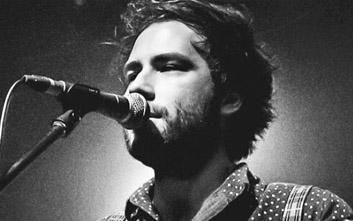You might be forgiven for thinking that you know surf music. Whether it’s the west coast sound of crunchy guitars and upbeat, 60s style chord progressions, or a cross pollination with skate culture. Even Ben Howard might be an acceptable guess.
But for Victoria’s Jimi Crisp, surf culture has evolved beyond these kinds of narrow representations, and stands in need of a fitting soundtrack. One that might start with his new single, Lady City.

Reflective, inventive and undoubtedly effective, Jimi Crisp is giving surf music a new face with Lady City.
The moniker of Torquay based Chris Hay, Jimi Crisp grew out of the DJ scene around Melbourne. An established name on the festival circuit, the DJ/producer/guitarist became disillusioned with “a scene that thrives on drugs and the exterior self”. Faults that were hard to reconcile with Hay’s life on the surf coast.
The founder of the Waves Music Co., Hay established this retail space turned music school to support and sustain the music coming out of the Victorian coastal scene. Straddling both local surf culture and music, Hay grew up doing both.
It was this scene that Hay brought Jimi Crisp to:
“Jimi Crisp ended up staying exclusive to the coast, honing closer in on lyrical content and instrumentation. It became more about bringing a touch of the nightclub scene to the coast, as opposed to the other way around.”
[soundcloud url=”https://api.soundcloud.com/tracks/313698412?secret_token=s-YPNSq” params=”auto_play=false&hide_related=false&show_comments=true&show_user=true&show_reposts=false&visual=true” width=”100%” height=”450″ iframe=”true” /]
Lady City is the debut from Crisp in this new iteration, a gently melodic hybrid of electronica and acoustic. Written inside and out the back of the Torquay music store, the track was produced by Waves Music Co.’s in-house sound wizard Luke Batterbury.
While Hay penned lyrics in between surfs and behind the counter, he attributes the “cleanliness” of Lady City to Batterbury’s touch, comparative to Jimi Crisp’s earlier output which he happily describes as “slightly unlistenable”.
The ambient guitar and synth across the track is certainly uninterrupted by grit or fuzz, and sparse beats reverberate with bass, softening into the mix. Hay’s vocals have an enjoyably lazy slant, even as the lyrics meander through imagined vistas and local nods to ocean life – and even Round The Twist.
Having set out to marry club and coast, Crisp certainly presents a near perfect unity on Lady City. Pulsing synths and a trancelike ambience echo deep house, but the track is lifted by the more organic sound of the acoustic guitar and song structure.
Amazingly, even the sound of ocean waves melds into the whole, rather than sitting like a gimmick off an old school Casio keyboard.
Characterising everyday life, Hay explains how “the whole Jimi Crisp thing” comes down to “surfing, business and then writing, recording, refining and tweaking.” And it’s this co-existence that prompted Hay-as-Crisp to look at redefining surf music as it is.
Faced with a far more diverse culture than the layover of surf rock caters for, “Jimi Crisp plans to help reinvent ‘Surf Music’ as a genre by creating a sound that better represents the surf culture on the Victorian coastline.”
Whether Crisp can voice, or instigate, this evolution on behalf of surf culture remains to be seen. But Hay is certainly not alone in pushing surf culture’s soundtrack forward; with artists like UK based surfer-songwriter Nathan Ball echoing this ambient new wave sound (excuse the pun) in the European scene.
Just as all culture needs to evolve and change, Crisp makes a good point as he asks “That Southern Californian sound, it’s just bizarre isn’t it? I don’t think Dick Dale represents me or the surfing community that I am apart of anymore.”



